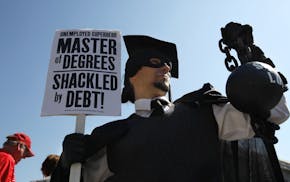It's the oldest trick in advertising's toolbox.
If you want to sell a car, television or power tool to a man, drop an attractive woman into the ad.
Vladas Griskevicius can't say for certain how well this tactic works, but he knows how it might work better: Surround the woman with a few attractive men, which will trigger a competitive and perhaps impulsive response in some of the men who view the ad.
"Sex sells," Griskevicius said. "But it sells in much more nuanced and subtle ways than we imagined."
Griskevicius is a professor at the University of Minnesota's Carlson School of Management, where he and some of his colleagues have undertaken some head-turning research to help explain why consumers make choices and decisions that are not always in their best interest.
Griskevicius' most recent paper, for example, shows that men make more impulsive spending decisions, save less money and accumulate more debt if they live in communities where women are in the minority.
Another study that Griskevicius conducted with colleague Kristina Durante found that women purchase and wear more revealing clothing when they are ovulating, and especially when they sense the presence of other attractive women.
Findings like these fly in the face of some of the underpinnings of economics, which says that humans are, by and large, rational beings. We make choices that will maximize utility, or make us happy, while increasing our wealth. We go to college because we know that it offers the promise of higher lifetime earnings. We pay a premium for a Prius because we will spend less on gasoline.
Behavioral economics, which draws heavily on psychology, has chipped away at the notion of humans being supremely sensible. How choices are framed can cause us to make decisions that are not always in our best economic interest. So, too, can our inability to calculate odds and measure the value of a potential loss against a gain.
Griskevicius' research builds and expands on this work by exploring the intersection of psychology, business theory and -- most notably -- evolutionary biology.
Take that decision to buy a Prius. Maybe it is a rational dollars-and-cents decision. Or maybe, as Griskevicius argued in a 2010 paper, buying it signals that you are altruistic and pro-social, important qualities in attracting potential mates and friends.
Some of the same themes emerge in his latest paper, just published in the Journal of Personality and Social Psychology.
Thanks to high school biology classes and nature shows on television, most of us know that animals' behavior can change depending on the number of potential mates. That led Griskevicius to wonder how sex ratios might influence saving, borrowing and spending rates.
When he married census reports with credit bureau data, Griskevicius found a high correlation between the average level of debt and the ratio of single adult men to women in each area. In Columbus, Ga., for example the average consumer debt is almost $3,500 higher than it is in Macon, a city less than a 100 miles away with a similar historical heritage and economic climate.
The biggest difference between the two cities? In Macon there are only 0.78 single men for every single woman, while in Columbus there are 1.18 single men for every woman.
Still, that didn't tell Griskevicius who was accumulating that debt. So, he and his colleagues conducted a number of elaborate experiments designed to measure the financial impulses of men and women based on their perception of whether there were too many men or too many women.
They found, consistently, that men spent more impulsively, saved less and accumulated more debt in situations where they perceived a shortage of women.
Women's spending and saving habits were relatively unaffected by sex ratios, but they expected men to spend more on an engagement ring, a dinner entree on a date, and a Valentine's Day gift if they too perceived that women were in the minority.
"In the animal world we call that mating effort," Griskevicius said.
Griskevicius' work has won him numerous awards from professional journals, and the 33-year-old professor recently picked up an award from the Foundation for Social and Personality Psychology that recognizes "research that places them at the forefront of their peers."
Griskevicius also has a book contract with a popular press imprint that will pull together some of his research.
Now, you might prefer to think that evolution has nothing to do with what clothes you choose to buy or the amount of money you save. Humans, after all, are at the top of the pyramid. We are self-aware and educated, so we like to think that the laws of natural selection no longer apply to us.
Griskevicius isn't buying it.
"It doesn't make sense that natural selection would apply to every other species except humans," he said.
ericw@startribune.com • 612-673-1736

Wieffering: Time to get over debit card fees
For Thrivent and others, warnings were there

With billions in sales, some co-ops are big business

